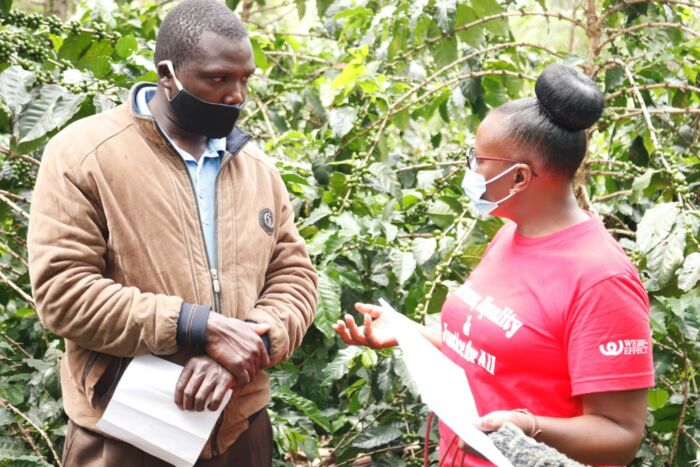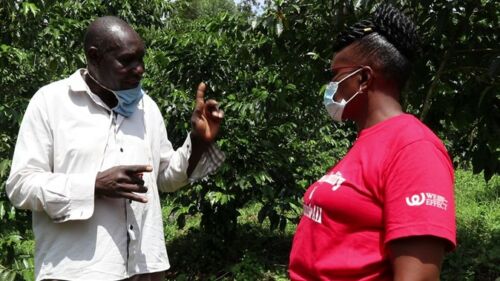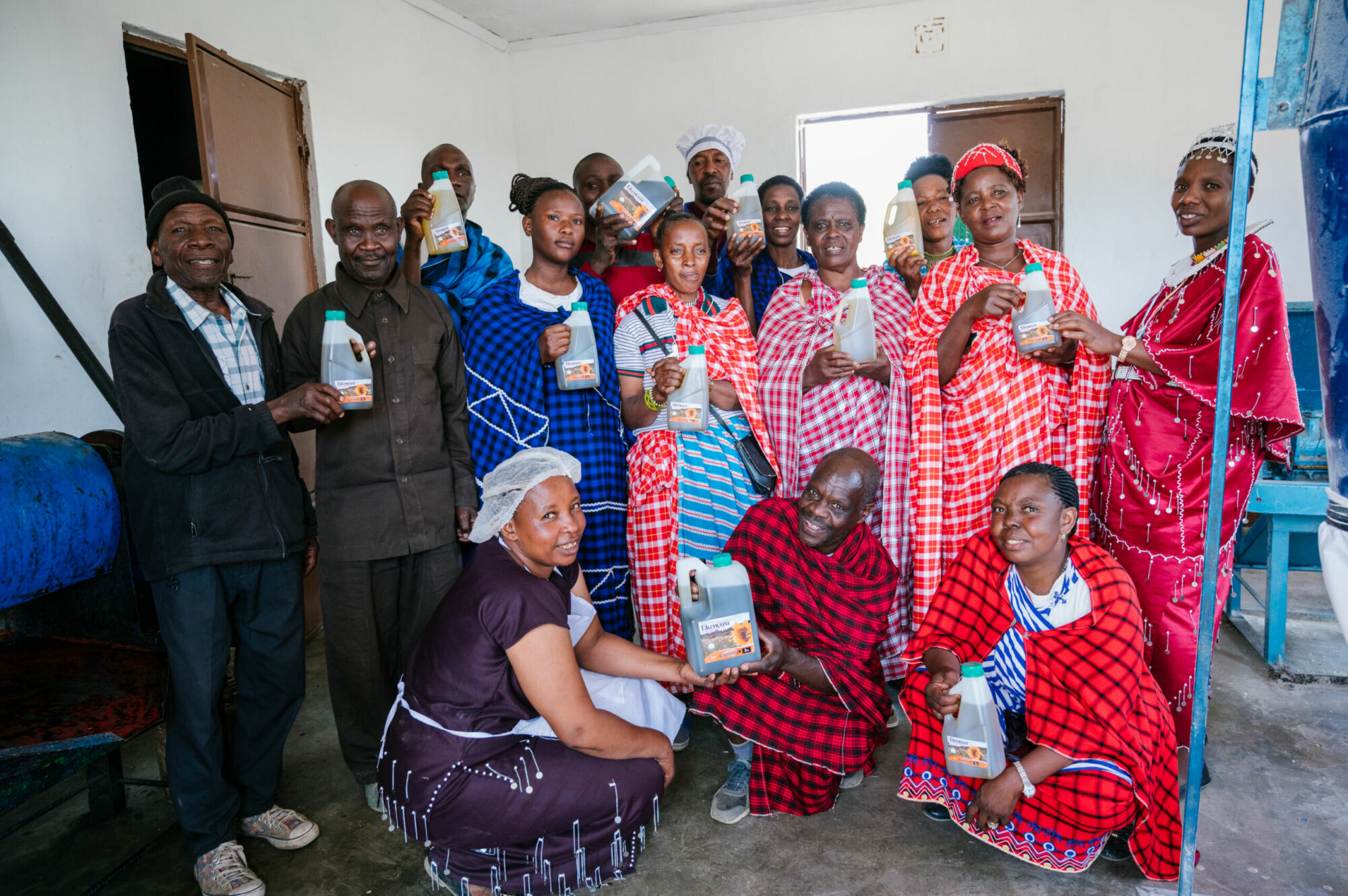The Gender Equality and Women Empowerment Project (GEWEP) links Advocates for Social Change – Kenya (ADSOCK) forums with opinion leaders. The sensitization on gender equality initiatives takes place through dialogue and awareness creation forums.
Advocates for Social Change – Kenya (ADSOCK) has been assisting farmer-based cooperatives such as Kipkelion, Gusii, and Baringo cooperatives to carry out gender audits and analysis to facilitate the smooth implementation of gender transformation approaches. One such approach is the integration and promotion of male champions whose role is to promote women’s social status and access to land.
Male champions act as male as agents of change towards gender justice. These are males willing to support gender equality and are sensitized especially on:
The role that men and boys play in justifying, maintaining and perpetuating gender injustices in the society, sensitization on understanding the nature of the hugely patriarchal communities & how societal norms create a conducive environment for gender injustice to thrive and regarding environment and climate change, sensitization is also done to these male champions for enhanced understanding of this vital area of community concern.
The aim of this approach has been to create a critical mass of men to champion gender equality & women’s rights by challenging and tackling patriarchal tendencies in communities and other structures not only on climate change issues but also on all the other gender equality concerns.
Hilary Lang’at, 36 years, is a smallholder farmer from Kipkellion and a member Kamiwa Cooperative Society. He is also a male champion who has embraced the need for women to participate in union affairs and apportioned part of their family coffee plantation to his wife.
“I know culture has taught us that we are the decision-makers in our families. However, this can be very misleading, especially when decisions over serious matters concerning the family need to be made. We all understand the saying that two heads are better than one. This is very true regarding decision-making at the household level.”
In fact, most of the conflicts we see in families result from exclusion, marginalization of women, and failure by the men to involve their wives in the decision-making process at home. However, things must not be this way. A functional family is one where everyone is consulted whenever a significant decision is to be made. That way, we devise well-thought-out solutions and minimize the possibility of conflict. Conflicts arise due to a lack of consultations in the first place.
In marriage, the husband and wife are members of the same team, not opponents. They both have the same goal, which is to improve the living conditions of the entire family. Therefore, when they work together, the burdens that life throws at them become lighter. The burdens are even fewer when the couple is working as a team.

Looking back, I can say I was terrible before joining the male champions movement. I had difficulty managing my family affairs and hardly had any ideas on planning my life. I didn’t know anything, and my mind was dormant.
I attended the first training expecting nothing new, just the usual stuff. However, when I got the information, I changed how I looked at things. That training is life-changing. The knowledge I received from the training came with many benefits, and I have witnessed many positive changes. This is not only beneficial in my life but also in my family.
Nowadays, I spend my time more productively as opposed to previous days. As a family, we have also made economic progress thanks to the joint decision-making my wife and I take part in. We plan together and achieve most of our goals, unlike when I did it alone. Our children’s schooling is not disrupted, and we can provide for them more sustainably.
The difference between the male champions’ training and other trainings is the lessons learnt which benefit my life and my family. I learned a great deal about how to manage my family. I also learned that there is no problem with my wife having her own investments to manage. This has helped us a lot. My wife has a hundred coffee bushes of her own and is free to decide how the money from the coffee will be spent and is now an active member of the cooperative with her membership number. That was rare before.
In fact, men in this community have started valuing and appreciating their spouses more. They are now seeing the benefits of being more responsible and being able to take good care of their families. They are seeing the importance of consulting each other on matters. When I changed my approach from making unilateral decisions to having consultations, I noticed there are hardly any disagreements in the family. We are now living well.
I consult my wife occasionally, and I have received very valuable advice. We plan our work together and work side by side on the farm. This is what made us get this far. Had there been conflict as it was previously, this coffee wouldn’t be the way it is. All you see is a result of our joint efforts and the fact that there is peace in the family.
The current Gender Based Violence (GBV) situation in the society is worrying. Every now and then, we see a lot of conflicts and intimate partner violence in the media. This leads to loss of lives and so much suffering. Members of the community, especially men, need to be sensitized on the importance of shunning violence and embracing dialogue, period!
Men should heed the advice that we are giving; fighting does not help. It is better to talk about the problem and come up with a solution instead of fighting. Parents should also be role models to their young ones as it is not good for parents to be fighting.
I would like to tell my colleagues and other men out there that there is equality, and everyone and more so women have rights.
It is important to listen to each other whenever there is a disagreement. I would also encourage elderly men to involve young people in coffee farming and other meaningful engagements as part of their succession plans. That way, their young ones will not suffer after their parents are gone. They should also offer guidance and mentorship on how to live well within families. Let them share tips on how they lived peacefully before, unlike now when there is too much conflict and violence in families. They should also allow their children to go to school for them to become better people in life.
Transforming Gender Norms: Male Champions have a duty to be Positive Role Models to young Boys and fellow men.
Mr. Richard Onuongá Samuel, 60 years is a founding member of Nyaguta farmers’ Cooperative Society in Gusii, Kenya. He also wears the hat of a male champion for gender justice, women, and girl-child empowerment.
I am a male champion by ADSOCK, so I have a role to play. I must walk the talk and be a positive role model to the boys and to my fellow men. Other men in the community need to have someone they can learn from and emulate. In my community, I strive to be that person.
I learnt a lot through the male champions training. The knowledge gained has transformed my way of thinking and the way I relate with others, especially my wife and children. Initially, I made all the decisions, whether major or minor, regardless of what my wife and children felt. I never valued their contribution since culture dictates that as the head of the family, the responsibility to make decisions lies squarely on me. In fact, I never thought for a moment that my wife, of all people, had the right to ask me any question.

The forums gave us the opportunity to meet and interact with other men. We shared experiences on life-related issues and learnt how to live well with our families, something which rarely happens. At first, it was just another of the many trainings I had attended. I, however, realized that there is need for married couples to embrace consultation when it comes to decision-making on all family matters, including finances. I also realized the need to shun violence and instead embrace dialogue as the means through which to resolve conflict and disagreements in the family.
Whenever a significant decision is to be made, we sit down and jointly deliberate as a family. My wife and children must have a say in every major decision in the family. You know, in my community, it is normal for men to give land and, in this case, coffee to their sons, but it is never the case when it comes to their daughters. In fact, I am one of the few men in the community who have apportioned part of my coffee plantation to my wife and daughters. I have a son and three daughters, all of whom I value equally. My son is yet to get his. When he attains the right age, I will definitely give him some coffee bushes as I did with his sisters and mother.
My advice to my fellow men is that we should not fear empowering our women and girls. That way, they find the opportunity to thrive and become successful in life, just like men. We should also prioritize sensitizing men and boys, including those yet to get married, on the need to shun violence and embrace dialogue as the alternative channel to resolve conflict. The same case should apply to those who are already in relationships. If we do, the sad news we hear daily in the news of intimate partner violence will be a thing of the past. In fact, we should start engaging them as early as the school-going age if we want to maximize the results.
As a man who has undergone sensitization, I have a role to play in reaching out to my fellow men, and especially my peers, with this good news. I do this passionately because it is the only way to transform the community and our country. I sincerely believe that when men embrace the principles of consultation and dialogue, there will be no more Gender Based Violence (GBV) cases.
Men lack a platform to meet, share experiences, and learn how to be better men.
Kemboi K. Amos is a 28-year-old farmer from Baringo and a member of Torongo Farmers’ Cooperative Society. When I was invited to attend the male champion’s training in 2018, I had no idea what the training was all about. I knew it was a training just like the ones the Union had organized in the past. Previously we were trained on how to improve productivity or become economically empowered members of society.

However, when the training finally took place, I realized it was different from the other sessions I had earlier attended. First, it was a men’s only forum, and second, the issues that were being addressed in the forum were just not the ordinary topics that we find during other trainings. We were engaged on issues touching our day-to-day lives, including how we live and relate with our wives and children. For instance, I realized that there are things that we do as men that hurt our partners, but we either don’t realize it, or we choose to ignore this reality.
A lot of unlearning and re-learning occurs in the sessions, and I recommend this training for every man out there, including the boys. The truth is men lack such a platform where they can meet, share experiences, and learn as men.
After the training, I returned home and decided to start a small organization later registered as a Community-Based Organization (CBO). The main aim of forming the group is to sensitize and empower the boy child. These boys will soon be fathers and husbands in the community. Our group currently has sixteen young men as its members, and we are in the process of recruiting more members. My friends and I have made it a practice to organize learning sessions through which we have candid discussions occasionally.
During the sessions, we discuss positive and negative masculinities and how to become more responsible. My advice to my fellow men is to shun violence and embrace dialogue as a means through which to resolve disagreements both in the community and at home.
At a personal level, the male champions’ model has transformed my life in a major way. I now sit down with my wife, and we have a discussion before making any major decisions on daily undertakings or investments. I have realized that most challenges married couples face can be avoided through dialogue. My wife and I agreed to discuss everything we always do, greatly improving our marriage. In fact, I can proudly say that my wife and I are best friends.
By the way, as men, we have a significant role to play in mentoring the boy child. This is because boys emulate what we do as men.
As such, we must be positive role models for them if we want to see responsible men tomorrow. It is also important to empower both the boy and girl child. Soon, the two are likely to marry and live as husband and wife. However, if one of them is enlightened and the other is not, then there is bound to be a lot of conflict leading to such cases. We should also give our daughters the opportunity to go to school for them to become successful in life.
Edited by Catherine Waking’a
